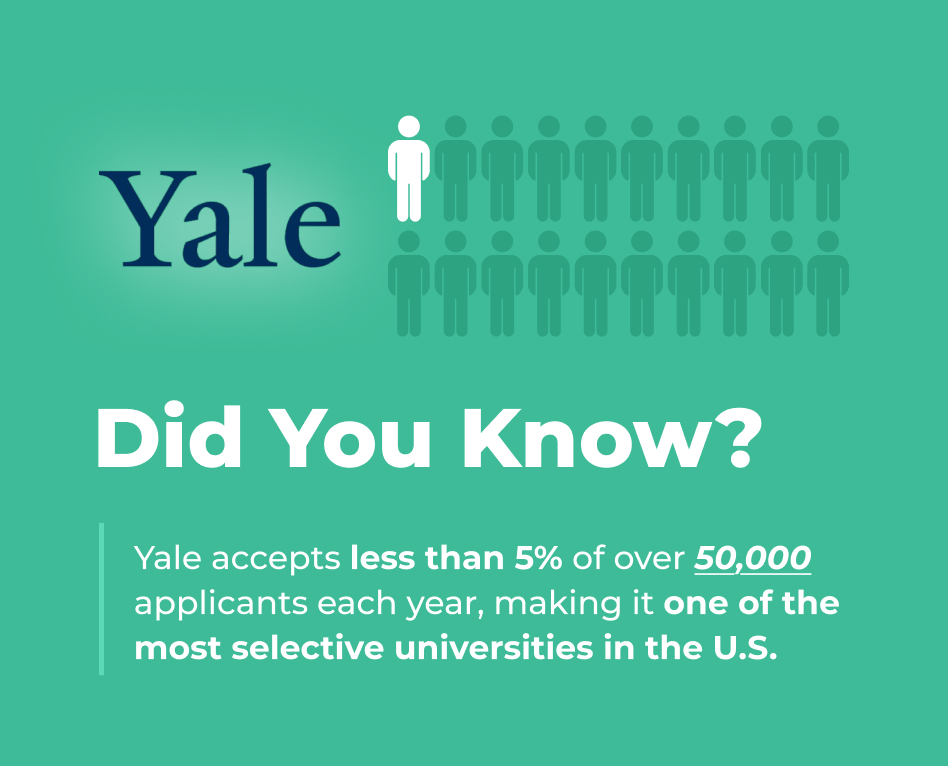
Yale University is one of the most prestigious institutions in the world, a member of the Ivy League that attracts tens of thousands of applicants every year. But just how hard is it to get into Yale? The answer lies in understanding the competitive nature of the Yale admissions process, the high standards of admitted students, and the holistic approach used by Yale’s admissions officers.
With an extremely low acceptance rate, rigorous academic expectations, and a detailed Yale application that includes supplemental essays, gaining admission requires more than strong test scores or a high GPA. It requires applicants to demonstrate intellectual curiosity, a strong academic track record, and a clear fit within the Yale community.

The Numbers Behind the Challenging Acceptance Rate at Yale University
The most straightforward way to begin answering “how hard is it to get into Yale?” is to look at the acceptance rate. In recent years, Yale’s overall acceptance rate has hovered between 4% and 5%. This makes it one of the most selective schools not just in the Ivy League, but in the country.
Yale’s admissions team receives over 50,000 applications each year and admits fewer than 2,500 students. For its Single-Choice Early Action program, the acceptance rate is slightly higher, but still extremely competitive.
The numbers speak for themselves: gaining admission to Yale University is incredibly difficult, and the vast majority of applicants are not accepted, even those with stellar academic records.
What Average GPA Do You Need to Get Into Yale?
There is no official cutoff for average GPA, but successful applicants to Yale often fall in the top 5% of their high school graduating class. The typical admitted student has taken the most challenging courses available at their high school, including advanced classes in a variety of academic areas.
Yale looks closely at your high school transcript. The admissions committee wants to see consistent academic excellence, but more importantly, evidence of intellectual curiosity and a willingness to stretch yourself academically.
While a high GPA is essential, it must also be supported by your college course selections. Taking easier classes to boost your GPA won’t impress the Yale admissions committee. They are looking for students who push themselves in meaningful and rigorous ways.
SAT and ACT Scores for Yale Admissions
Yale University is moving to a test-flexible policy, meaning you can apply with SAT scores or ACT scores or with Advanced Placement or International Baccalaureate exam scores instead. Many accepted students will likely choose to submit strong SAT or ACT scores to bolster their applications.
The average SAT score for students admitted to Yale tends to fall between 1480 and 1570, and the average ACT score ranges from 33 to 35. These scores represent the top 1–2% of all test-takers nationally.
Submitting impressive standardized tests, if you have them, can help provide admissions officers with another data point that supports your academic readiness for college.
It’s also worth noting that Yale admissions officers evaluate your test scores in context. They look at how your scores align with your high school class, your school’s curriculum, and the rest of your application process.

What Else Does the Yale Admissions Committee Look For?
Yale uses a holistic admissions process to evaluate every applicant. This means that the admissions committee doesn’t just focus on numbers like GPA and test scores. They also review your personal statement, extracurricular activities, community involvement, and letters of recommendation.
Yale is looking for students who will make meaningful contributions to the Yale community. That might mean demonstrated leadership skills, an original academic direction, or a proven commitment to a particular cause.
Applicants who receive a positive admissions decision often show a combination of:
- Strong academic interests
- Unique passions or achievements
- A thoughtful and authentic voice in their personal statements
- A desire to define community and engage with others
- A deep understanding of Yale’s values
The admissions team is not just selecting students with perfect resumes. They are selecting future Yale students who will make the most of Yale’s extraordinary resources and contribute to the broader mission of the university.
Which Extracurriculars Matter at Yale?
Yale seeks well-rounded individuals with specific strengths. Your extracurricular activities should reflect genuine interests rather than a desire to “check the box.”
This might include leadership roles in school or community organizations, artistic or creative accomplishments, research or academic projects, or volunteering and community involvement. Yale’s resources also serve entrepreneurial ventures or original ideas, so they value that type of experience as well.
What matters most is the depth of your commitment and how your activities reflect the person you are. The admissions officers at Yale want to see that you’ve used your high school years to explore passions and make a significant impact in your chosen areas of interest.
Yale Application Components and Timeline
The Yale application is detailed and requires careful attention. Applicants must submit the Common Application, Coalition Application, or QuestBridge Application, along with the Yale-specific supplement.
Key components include:
- Personal essay
- Yale supplemental essays
- High school transcript
- School report and counselor recommendation
- Two teacher recommendations
- Midyear report
- SAT or ACT scores or AP or IB scores
The Yale application deadline for Single-Choice Early Action is typically November 1, while the Regular Decision deadline is January 2. Whether applying early or not, your application must be complete, polished, and deeply reflective of your character and achievements.

Should You Apply Early to Yale?
Yale offers Single-Choice Early Action, a non-binding early application option. Unlike Early Decision, it does not require you to attend if admitted, but it does restrict you from applying early to other private colleges.
Applying early can signal a strong interest and may offer a slightly higher acceptance rate. However, early applicants are still held to the same high standards as those who apply during the regular cycle.
If you are confident in your high school transcript, test scores, and personal statement, applying early may offer an advantage. But it is not a strategy for weaker applicants looking for a shortcut. The Yale admissions committee expects early applications to be just as competitive.
Related Article: Does Applying Early Action or Early Decision Increase Your Chances of Acceptance?
Financial Aid and Yale’s Commitment to Access
Yale University is committed to need-blind admissions and meets 100% of demonstrated financial need. If you’re concerned about financial aid, know that Yale offers one of the most generous aid programs in the country.
Yale does not use financial status as a factor in admissions decisions. That makes attending Yale possible for talented students from all backgrounds.
This also means that future applicants should focus on submitting the strongest possible Yale application, knowing that the university will provide financial support if they are admitted.
Reach for the Ivy League School of Your Dreams
The reality is that getting into Yale is extremely difficult. However, you can gain admission with the right strategy, deep self-awareness, and a compelling, authentic application.
If Yale is your dream school, Spark Admissions can help. Our expert admissions consultants have assisted students from all backgrounds in gaining acceptance to Top 50 colleges like Yale University through strategic planning, application development, and personalized guidance.
We’ll guide you through every step of the application process, from crafting compelling Yale-specific essays to submitting your application by the correct deadline. Contact us today to schedule a consultation and start building a plan towards admitted student status at Yale University.


